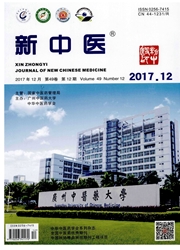

 中文摘要:
中文摘要:
目的:探讨二至汤含药血清对不同肿瘤细胞的抑制作用及其最佳给药方案。方法:采用中药血清药理学方法,选择不同剂量的二至汤水溶液以高、中、低剂量灌胃方式给药,以空白血清组为对照组,考察不同给药天数、不同采血时间点大鼠含药血清分别与人肝癌细胞BEL一7402、肺癌细胞A549作用不同时间段后的抑制作用,应用MTT法检测含药血清对不同肿瘤细胞的抑制作用,并考察其诱导细胞凋亡的作用。结果:通过筛选得出二至汤中剂量给药5天,给药后3h的含药血清对肝癌细胞BEL一7402和肺癌细胞A549抑制率最高可达38.81%和38.29%,与空白血清组比较,差异有非常显著性意义(P〈0()1),并且能够诱导肺癌细胞发生凋亡,与空白血清组比较,差异有显著性意义(P〈0.05)。结论:二至汤中剂量给药5天,并在给药后3h取血,与细胞培养48h,对肝癌、肺癌的抑制作用效果明显,并能诱导肺癌细胞发生凋亡。
 英文摘要:
英文摘要:
Objective: To investigate the inhibition of serum containing Erzhi Decoction on different tumor cells and to find out the optimal dosing regimen. Methods: With the blank serum as the control, MTT assay was used to investigate the effect of medication time, medication dosage, blood sampling, and culturing time on the inhibition of BEL-7402 and A549 with serum containing Erzhi Decoction. FITC/PI flow cytometry was adopted for the screening of optimal regimen and for the testing of BEL-7402 and A549 apoptotic rate. Results: Serum containing Erzhi Decoction showed certain inhibitory effect on BEL-7402 and A549, the inhibitory rate was 38.81% for BEL-7402 and 38.29% for A549, and the difference was significant as compared with the blank serum group(P 〈 0.01). Serum containing Erzhi Decoction could remarkably induced apoptosis of lung cancer cells and had significant difference from the blank group(P 〈 0.05). Conclusion: The optimal regimen for Erzhi Decoction is in moderate dose for 5 days. The optimal blood sampling time is three hours after last medication, and the medicine serum collected at this time has the strongest effect on inducing A549 apoptosis after culturing for 48 hours.
 同期刊论文项目
同期刊论文项目
 同项目期刊论文
同项目期刊论文
 期刊信息
期刊信息
